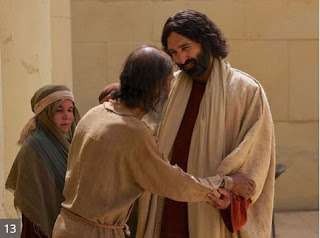Photo Credit: www.LumoProject.com, www.freebibleimages.org
MIRACULOUS HEALING Part One
By Gail K. Kachnycz; 22 March 202, revised 17 February 2024
During our
journey through chronic illness and care-giving, there have been friends that
have told us that they are praying for miraculous healing for my loved one’s
condition. A few have been close and dear friends who care about us deeply. We
appreciate these prayers. We also worship in a fellowship that believes that
the miraculous gifts of the Spirit are active in this modern time. However, Mike has never sensed from the Lord that it is His plan to heal
miraculously. The illness progressed through various stages of decline. First,
it was manageable and full employment was possible. Next, accommodations at
work were needed. Eventually long term disability status was granted in 2012.
Finally, all avenues of medical treatment were exhausted and hospice at home
began in fall 2018. Through all these events, we did not sense that the Lord
was directing us to pray for miraculous healing.
A miracle of healing can take place in this
day and age. However, it is not always the Lord’s plan for everyone. If that
were the case, people would profess faith in Christ simply to be healed of
cancer or any other debilitating or terminal disease. The ultimate goal of
faith is God’s glory, not man’s convenience or comfort.
My counsel to
people who want to pray for miraculous physical healing is this: seek the Lord
for His guidance in this matter. Be sure that the attitude for prayer for
healing is not actually denial of the disease. If this issue has been
addressed, and you still feel led to pray for miraculous healing, do so.
However, until that healing takes place, do not ignore the practical realities
of the illness that the person and family are facing. To paraphrase 1
Corinthians 14:15, pray in the spirit (for miraculous healing), but also with
understanding (for symptom relief and practical help).
If you are the person experiencing chronic illness and have concerned family or friends praying for miraculous healing, they may question why you are not doing the same. If miraculous healing is not taking place, they may suggest that the problem is either that there is unconfessed sin in your life, or that you don’t have enough faith to be healed. These are deep issues. A brief examination of both will be addressed. First, sin connected to sickness. Next week we will examine faith and healing.
SIN CONNECTED TO
SICKNESS
There are scriptures that seem to connect sin and sickness. Matthew Chapter 9 records the story of a man healed of paralysis.
Jesus stepped into a boat, crossed over and
came to his own town. Some men brought him a paralyzed man, lying on a mat.
When Jesus saw their faith, he said to the man, “Take heart, son; your sins are
forgiven.”
At this, some of the teachers of the law
said to themselves, “This fellow is blaspheming!”
Knowing their thoughts, Jesus said, “Why do you entertain evil thoughts in your hearts? Which is easier: to say, ‘Your sins are forgiven,’ or to say, ‘Get up and walk’? But I want you to know that the Son of Man has authority on earth to forgive sins.” So he said to the paralyzed man, “Get up, take your mat and go home.” Then the man got up and went home. When the crowd saw this, they were filled with awe; and they praised God, who had given such authority to man. Matthew 9:1-9
In John 5:1-15, Jesus heals the invalid who had been lying at the Pool of Bethesda for 38 years. Verse 14 notes:
Later Jesus found him [the healed invalid] at the temple and said to him, “See, you are well again. Stop sinning or something worse may happen to you.” John 5:14
In His comments to the healed invalid, Jesus
seems to indicate that in certain cases individual sin can lead directly to
sickness and other difficulties. However, it must be made clear that this is
not always the case. It is unwise to
assume that the same issues contribute in the same ways in every case of
sickness and disease. The sin that results in suffering is the consequence of
the disobedience of Adam and Eve; we live in a fallen world. (Genesis Chapter
3)
The entire book of Job documents that a man who was blameless was afflicted with a severe debilitating illness. In John 9:1-12, there is a description of the healing of a man born blind.
His disciples asked him, ‘Rabbi, who sinned, this man or his parents, that he was born blind?’...”Neither this man no his parents sinned,” said Jesus, “but this happened so that the works of God might be displayed in him.”
Both Job and the man born blind were physically healed, but the ultimate purpose was God’s glory. Job even says, "Though he [God] slay me, yet will I hope in him;” (Job 13:15). Job was committed to faith in God, regardless of the circumstances of his life. In some instances, faith in the face of chronic or terminal illness is more miraculous than if physical healing had occurred. This type of faith can open doors to sharing the reason for hope in the most depressing of situations.
Bitterness and
unforgiveness can lead to a negative mental outlook, which will have an impact
on physical and mental health in general. Unconfessed sin is never a good
thing. Addressing strongholds of sin in a person’s life will always be helpful.
However, it will not always automatically result in miraculous physical
healing.
Anyone, not just those with chronic illness, can harbor resentment, bitterness, or sin that is buried. Everyone should examine their hearts for sin that needs confession and forgiveness. If the sin is deeply rooted, it is recommended that the individual not try to delve into areas of sin that have taken hold alone, but instead seek proper spiritual oversight. The pastor of the church where you are a member may provide counseling or refer to a Christian counseling center. If payment for counseling is an issue, consider secular counseling covered by insurance and separate sessions with the pastor. The Unbound* program follows scriptural principles; check if there is a team in your area. If addiction is present, Celebrate Recovery* addresses addiction with a 12 Step Program incorporating scripture as the foundation.
Unbound; Heart of the Father https://heart-of-the-father-minitries.thinkific.com
Celebrate Recovery 12 Step Program https://www.celebraterecovery.com



No comments
Post a Comment